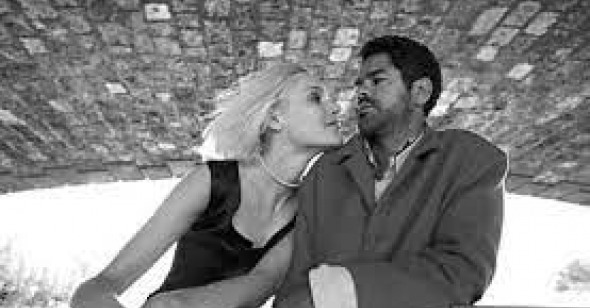Carrying the Torch
By Vicente Rodriguez-Ortega
Angel-A
Dir. Luc Besson, France, Sony Pictures Classics
The rise of non-white French filmmakers throughout the Nineties allowed viewers around the world to escape the safe zone of “Paris, the City of Love” and plunge into its crisscrosses of violence, racial bias, psychological imbalance, and sexual abuse. Now, Luc Besson’s Angel-A, his first film since the lavish and catatonic The Messenger: The Story of Joan of Arc (1999), self-consciously retreats into postcard-Paris aesthetics for its tale of love between a skinny, tall angel (Rie Rasmussen) and a tiny loser (Jamel Debbouze).
Besson unambiguously stated that he aimed to capture the “true, beautiful Paris, the one that enthralls millions of tourists every year and we, Parisians, walk past every morning, head down, lost in our personal paradise.” True or false, the Paris Thierry Arbogast’s camera photographs is an empty and black-and-white tapestry of early dawns, multilayered bridges caressing the Seine’s banks, and vast skies crossed by torrents of perfect clouds. This is the ideal mise-en-scène for the whimsical love story between pathetic André and chic Angela, which blossoms amidst a predictable roster of caricatured small-time crooks. Before savior Angela’s magical sudden appearance, André has to deal with the thugs’ attempts to break his fingers due to his failure to pay debts; but after she glues her fate to his, it’s all a walk in the park—the crooks fall easily under her spell and her sharp fists. André is free to ramble on incessantly, while Angela chain smokes, dresses like a “sexy bitch,” uses her body to charm thugs, and persistently attempts to convince André to believe in his own worth. Her “assignment” is to fix up André, who’s cursed by constant bad luck and a lukewarm sense of fatal defeat. Shit, is this one of these “edifying” stories about the importance of spiritual self-improvement? Just in case you’re getting increasingly mortified, let me also mention the final showdown at the Seine between the two lovers-to-be, as they challenge nature and religion—gravity and God—to remain together.
But don’t panic just yet. Perhaps if it wasn’t for Debouzze’s nervous charm and Rasmussen’s controlled chic, Besson’s ode to his city would be simply that. However, the actors’ masterful alternation between heartfelt fragility and loquaciousness redeem Besson’s project, enveloping it with a distinctive layer of fatalistic allure. Angel-A is an ideal date film if you’re not afraid to strip yourself of cinephilic sophistication and plunge into its fleeting, “cheesy” pleasures. If you’re an aficionado of Gaspar Noé’s tales of transcendent gore, Catherine Breillat’s vaginal epics, or Olivier Assayas’s visually heterogeneous fables of grainy violence, à la demonlover, please stay put; if you dig Wong Kar-wai’s polyphonic glimpses at cityscapes, you may want to give Angel-A a look.
Like Amélie, a bubblegum mélange of saturated colors and cute weirdos, Angel-A makes no effort to engage with any sort of social reality. Instead, it cauterizes its clean-cut whimsical romance by foregrounding Paris’s iconic landmarks. Despite the continuous verbal batteries between Angela and André, these monumental markers of beauty parade before our eyes in an effort to make us impulsively rush to Orbitz and buy a ticket to spend a week eating Grand Marnier crepes and lining up for seven hours and 31 minutes to catch a glimpse of the Mona Lisa. Perhaps this is the ultimate function of Angel-A: as an hour-and-a-half commercial for Paris and its hosting for the 2012 Olympics—a project in which Besson is deeply involved.
Whether you find Angel-A a fiasco or a sweet tale of unexpected love depends on your inclination to accept or neglect Besson’s scattershot ambitions: he shoots in many promising, even slightly provocative directions (e.g. it initially seems Angela whores herself to help André) before ultimately falling back into a cheap comfort zone. With Paris as his fundamental representational axis, Besson thus needs to offers no more than an hour and a half of clichéd romance buoyed by spectacular cinematic craft. For Paris is the “city of love” only so long as unambiguous heterosexual matches such as these perpetuates themselves. Take it or leave it.
